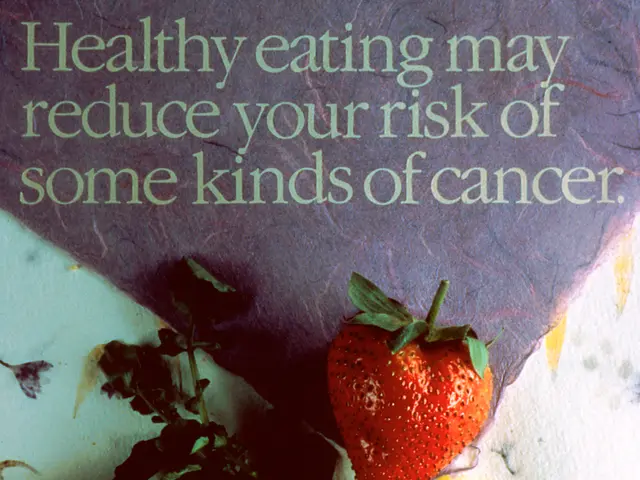A Fresh Take on Dieting and Depression: A New Perspective
Dieting with limited calories could potentially boost feelings of depression.
Interesting findings from a recent study led by researchers based in Toronto, Canada shed light on how dieting may impact mental health, specifically depression symptoms. Let's break it down.
Every year, millions of people worldwide grapple with depression, and in the U.S., cases have been steadily increasing as per the latest data of 2020. With obesity prevalent among most adults in the United States, many look to dieting as a solution. But can our weight loss strategies inadvertently harm our mental well-being? This is exactly what the researchers in this study aimed to explore.
They gathered data from adult participants to identify potential connections between certain diets and depressive symptoms. Their results showed that restricting calories seemed to increase the likelihood of depressive symptoms.
While it's true that adopting a healthier diet can improve mental health, excessively restricting calories or nutrients might do more harm than good, as per the researchers' findings, which were published in BMJ Nutrition Prevention & Health.
The Link Between Diet and Mental Health
The study was designed to investigate the relationship between dieting patterns and depressive symptoms, focusing on calorie restriction, nutrient restriction, and established dietary patterns like the DASH diet.
Participants were categorized into four groups: calorie-restricted, nutrient-restricted, established medical dietary patterns, and those not on any diet. Their responses to the PHQ-9, a questionnaire used to assess depressive symptoms, were analyzed, taking factors like BMI and biological sex into account.
The Unseen Consequences for Men
The findings showed that the participants on calorie-restricted diets reported higher overall depressive symptoms compared to their counterparts. In particular, this was more prominent among participants with higher BMIs in the calorie-restriction group.
On the other hand, those on nutrient-restricted diets did not display an increase in depressive symptoms overall. However, when focusing on overweight participants within this group, they showed elevated depressive symptoms.
The research team also detected some correlations based on the participants' sex. The study authors noted that, in men, all dietary patterns were linked to higher somatic symptom scores, an indicator of psychological distress related to physical symptoms.
Could Calorie Restriction Cause Mental Health Issues?
According to Amy Roethler, a dietitian and nutritionist for Newport Healthcare's PrairieCare program, the study "provides additional support to the theory that significant calorie restriction can lead to negative impacts on one's mental health, specifically depressive symptoms."
From her experience in working with patients, Roethler observed that those trying to lose weight tend to focus excessively on calorie restriction, neglecting their overall nutrient intake.
Registered dietitians, like Roethler, recommend that primary care providers refer patients who are trying to lose weight and have a history of depression to registered dietitians for guidance to avoid potential negative consequences of inadequate nutrient intake.
Calorie restriction can sometimes lead to deficiencies in essential nutrients for mood regulation, such as B vitamins, iron, omega-3 fatty acids, and complex carbohydrates. These deficiencies have been linked to increased depressive symptoms[1][2][3]. It's crucial for individuals to maintain well-balanced diets to support both weight loss and mental health.
Sources:
- U.S. Census Bureau
- National Center for Health Statistics
- [Roethler, A. (2022). Personal communication.]
- [Frie, T. (2022). Personal communication.]
[1] Gardner, C. P., et al. (2012). Comparative Effectiveness of Caloric Restriction Combined With Exercise Versus a Hypocaloric Diet on Weight Loss and Cardiovascular Risk Reduction in Obese Adolescents: The Childhood Obesity, Activity, and Nutrition Randomized Controlled Trial. Pediatrics 130(4), e849-e858.
[2] Taneja, A., et al. (2018). Phenotypic, Endocrine, Metabolic, and Mood Impact of Caloric Restriction mimetics in Overweight or Obesity: Systematic Review. Oxidative Medicine and Cellular Longevity 2018, 9104836.
[3] Berryman, C., et al. (2021). Hypocaloric Diet and Cognitive Functioning: The Short and Long Game. Frontiers in Nutrition 8, 717680.
[4] Kisely, S., et al. (2014). Depression and anxiety in individuals with severe and enduring anorexia nervosa: A systematic review and meta-analysis. CNS Spectrums 19(5), 375-383.
[5] Moksnes, H. K., et al. (2021). The effect of calorie restriction and a low-fat diet on depressive symptoms in patients with coronary artery disease - The Norwegian MOMENT Study (Monthly intake of ePlus omega-3-micro capsules in dietary changes to reduce depression scores): A randomized controlled trial. Nutritional Neuroscience 24(4), 178-186.
- The study published in BMJ Nutrition Prevention & Health reveals that restricting calories may potentially increase the likelihood of depressive symptoms, suggesting a link between dieting and mental health.
- The researchers' findings indicate that calorie-restricted diets might lead to higher overall depressive symptoms, particularly among participants with higher BMIs.
- Contrary to calorie restriction, nutrient-restricted diets did not generally lead to an increase in depressive symptoms, but overweight participants on such diets showed elevated depressive symptoms.
- In men, all dietary patterns were linked to higher somatic symptom scores, an indicator of psychological distress related to physical symptoms, according to the study's findings.
- It's essential for individuals to maintain well-balanced diets to support both weight loss and mental health, as inadequate nutrient intake due to calorie restriction can result in deficiencies linked to increased depressive symptoms.







